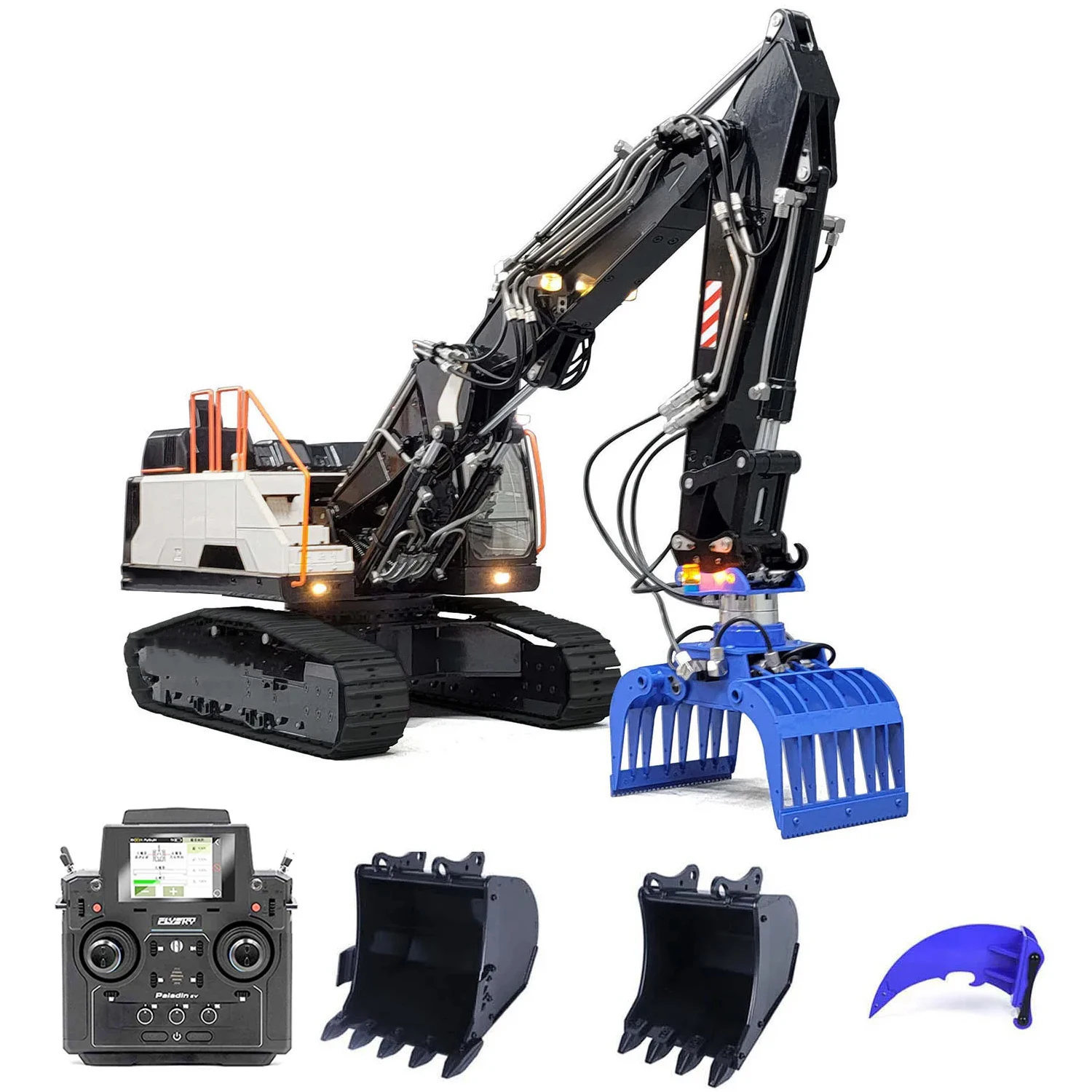Comprehending How Excavator Works and Its Effect On Efficiency
Excavators play a necessary role in construction and mining operations, depending on a complicated interaction of hydraulic and mechanical systems. Their capacity to execute a selection of tasks rests on both their layout and the technology incorporated within. Recognizing these elements can greatly impact operational effectiveness and productivity. As innovations remain to reshape the market, one have to think about exactly how these modifications will influence future techniques and efficiency.
The Fundamentals of Excavator Mechanics

The Function of Hydraulic Solutions in Excavators
At the heart of excavator procedure lies the hydraulic system, which plays an essential duty in powering the device's activities and functions. This system utilizes pressurized hydraulic fluid to move power, enabling various actions such as digging, swinging, and lifting. By harnessing the principles of hydraulics, excavators can carry out jobs with impressive accuracy and pressure, boosting general functional efficiency.The hydraulic system is composed of vital components, consisting of pumps, valves, and cyndrical tubes, which collaborate to control the circulation and direction of the liquid. When the operator engages the controls, the hydraulic fluid is routed to particular cylinders, equating the operator's commands right into physical movement. This device enables smooth and receptive activities, which are important in construction and excavation settings. double e volvo rc excavator. The performance of the hydraulic system directly influences the productivity and convenience of the excavator, making it a crucial element in contemporary excavation processes
Trick Components of an Excavator
Recognizing the key parts of an excavator is vital for realizing exactly how this effective machine operates. An excavator includes numerous considerable elements, consisting of the undercarriage, house, boom, arm, and pail. The undercarriage supplies stability and flexibility, usually including tracks or wheels to navigate different terrains. The residence consists of the engine and hydraulic systems, allowing the driver to control activity and power the device. The boom expands from the home, enabling upright reach, while the arm connects to the container, facilitating excavating and lifting operations.Additionally, the taxi houses the driver, equipped with controls for exact maneuvering. Each of these elements plays an important duty in the excavator's total functionality, adding to its efficiency and efficiency on building and construction websites. Understanding these parts aids in maximizing and maintaining excavator performance, making certain jobs are completed securely and properly.
Attachment Flexibility and Its Benefits
Accessory adaptability is a crucial element of excavators, making it possible for drivers to switch over in between various tools customized for details jobs. This adaptability not only enhances job efficiency however likewise adds to cost-effectiveness by lowering the demand for numerous makers. Comprehending the different kinds of add-ons readily available can substantially affect the total efficiency and performance of an excavator on job sites.
Sorts of Add-ons
While excavators are largely acknowledged for their digging capacities, their true versatility hinges on the vast variety of accessories readily available. These attachments boost the excavator's capability, allowing it to do different tasks past excavation. Common add-ons consist of containers (for digging and scooping), hydraulic thumbs (for comprehending materials), and augers (for piercing holes) Grapples are made use of for moving and handling debris, while rippers can damage up difficult surface areas. Other specialized attachments, such as plates and plows, allow excavators to adapt to details work demands. This diversity not just raises the maker's utility throughout various industries, including demolition, landscape design, and building and construction, but additionally allows drivers to tailor their tools to meet details job needs effectively.
Increased Work Efficiency
Optimizing job performance is a main benefit of utilizing numerous excavator attachments. Various attachments enable an excavator to perform several jobs without needing to change devices, saving useful time and labor. Using a hydraulic hammer can damage concrete while a container add-on can dig deep into soil, making it possible for a smooth workflow. This flexibility minimizes downtime connected with equipment modifications and boosts performance on-site. In addition, specialized attachments boost precision in jobs such as grading or landscape design, causing better end results. The ability to adapt to various job requirements not only simplifies operations yet additionally decreases the demand for added equipment, guaranteeing that jobs are finished quickly and efficiently. Overall, attachment versatility considerably contributes to increased job performance in excavation work.
Cost-Effectiveness and Adaptability
Cost-effectiveness is a substantial benefit of using flexible excavator accessories. These accessories allow a single excavator to carry out several jobs, minimizing the need for additional machinery and labor - double e volvo rc excavator. By switching between containers, hammers, and grapples, operators can take on different tasks, from excavating to demolition, therefore making the most of equipment utilization. This flexibility not just reduces operational costs yet also reduces downtime associated with changing tools. In addition, the capability to personalize excavators with specialized accessories enhances performance, as they can effectively handle varied tasks according to project needs. To wrap up, the combination of cost-effectiveness and convenience in excavator accessories contributes to boosted operational performance and source allocation in building and construction and excavation jobs

Advanced Technology in Modern Excavators
Modern excavators are progressively geared up with advanced technology that changes excavation processes. Automation streamlines procedures, while improved gas effectiveness minimizes functional prices. Furthermore, smart control systems improve accuracy and security, noting a substantial development in excavation tools.
Automation in Excavation Processes
As excavation innovation develops, automation has actually emerged as an important part in enhancing efficiency and accuracy on job sites. Modern excavators are outfitted with sophisticated automated systems that promote jobs such as grading, digging, and trenching with very little driver intervention. These systems make use of sensing units, GPS, and device understanding formulas to guarantee exact placing and depth control, considerably decreasing the margin for error. Furthermore, automation permits operators to concentrate on calculated decision-making rather than hands-on controls, resulting in boosted efficiency overall. Such technologies not just enhance operations but likewise boost security by decreasing human error in intricate procedures. The integration of automation in excavation procedures stands for a considerable innovation in construction technology, driving the market in the direction of higher performance and efficiency.
Improved Fuel Effectiveness
Innovations in modern technology have actually additionally brought about substantial renovations in gas performance for modern excavators. Modern machines are geared up with innovative engines that enhance power outcome while reducing fuel intake. These engines use ingenious combustion innovations, such as turbocharging and direct gas shot, to improve performance and effectiveness. In addition, light-weight materials in building decrease overall weight, allowing for much less energy expenditure throughout procedure. The introduction of variable speed controls makes it possible for drivers to change engine performance according to specific jobs, further minimizing gas use. As a result, these improvements not just lower functional expenses however also add to environmental sustainability by reducing exhausts. Generally, enhanced gas effectiveness in excavators is a crucial growth that boosts productivity and economic practicality in the construction sector.
Smart Control Systems
While operators browse increasingly complicated task sites, smart control systems in excavators have become important tools for enhancing performance and accuracy. These sophisticated technologies utilize sensors and formulas to monitor various specifications such as load weight, surface conditions, and operational performance. By instantly changing hydraulic functions, wise systems maximize device efficiency, causing enhanced productivity and minimized wear on elements. In addition, operators profit from intuitive user interfaces that give real-time comments and Read Full Report diagnostics, permitting educated decision-making. This find more information assimilation of innovation not just streamlines operations but additionally lessens human error, adding to safer job environments. As the construction market proceeds to progress, smart control systems will play a crucial duty fit the future of excavator efficiency and efficiency.
Enhancing Operational Effectiveness With Excavators
Excavators play a vital duty in enhancing operational effectiveness across different construction and excavation projects. Their flexibility enables for several tasks, including material, training, and excavating handling, which enhances process and minimizes the requirement for additional equipment. With effective hydraulic systems, excavators can execute durable tasks with precision, considerably lowering the moment needed to complete tasks. The assimilation of sophisticated technology, such as general practitioner and automated controls, additionally enhances their operation, making it possible for operators to achieve greater accuracy and lower material waste. In addition, modern-day excavators are made to eat less gas and lessen discharges, contributing to both cost financial savings and ecological sustainability. By using excavators efficiently, building and construction groups can enhance performance, fulfill job deadlines, and boost overall website administration. This multifunctionality and performance make excavators vital tools in the modern-day building landscape.
The Future of Excavators in Building And Construction and Mining Industries
As the construction and mining industries develop, the future of excavators is poised for considerable improvement driven by technological advancement and transforming functional needs. Breakthroughs in automation and man-made knowledge are reshaping excavator capabilities, enabling enhanced accuracy and performance in procedures. Self-governing excavators are arising, decreasing the demand for human treatment and reducing the threat of accidents.Moreover, the integration of telematics and IoT innovation makes it possible for real-time tracking of equipment performance and anticipating maintenance, maximizing uptime. Green styles, including electric and hybrid versions, are gaining traction, straightening with sustainability goals within the industry.Additionally, making use of innovative products and lighter styles improves gas performance while maintaining efficiency requirements. As these fads progression, excavators will play an essential function in satisfying the raising needs for productivity and security in building and construction and mining, inevitably changing functional landscapes.
Frequently Asked Questions
How Do Weather Influence Excavator Efficiency?

Weather conditions significantly affect excavator performance, as rain and mud can impede traction and stability, while extreme temperatures might affect hydraulic systems. Operators has to adapt to these variables to guarantee suitable performance and safety during procedures.
What Precaution Should Operators Comply With While Using Excavators?
Precaution for excavator drivers include putting on ideal personal safety equipment, conducting pre-operation inspections, ensuring correct interaction with ground employees, preserving a risk-free distance from overhanging risks, and sticking to established functional methods to stop crashes.
How Commonly Should Excavators Be Maintained for Ideal Efficiency?
Excavators need to be maintained on a regular basis to assure peak performance, usually every 250 operating hours or as defined by the manufacturer. Routine checks enhance dependability, prevent unforeseen break downs, and extend the life expectancy of the devices.
What Is the Ordinary Lifespan of an Excavator?
The typical lifespan of an excavator usually ranges from 10,000 to 15,000 hours of operation. Aspects affecting longevity consist of upkeep methods, running conditions, and the quality of the equipment itself, affecting total productivity and efficiency.

Can Excavators Operate on Irregular Surface Efficiently?
Excavators can run successfully on irregular surface because of their expressed designs and flexible tracks. These functions allow them to keep security and traction, enabling reliable operation in difficult settings typically come across in construction and landscape design jobs. Each you could try these out of these parts plays a vital duty in the excavator's general functionality, contributing to its effectiveness and performance on construction sites. Making best use of job efficiency is a main benefit of making use of different excavator attachments. While operators navigate significantly intricate job sites, smart control systems in excavators have emerged as vital tools for improving performance and precision. Excavators play a necessary function in enhancing functional effectiveness across various building and construction and excavation tasks. Breakthroughs in automation and fabricated knowledge are improving excavator capabilities, permitting for enhanced accuracy and performance in operations.